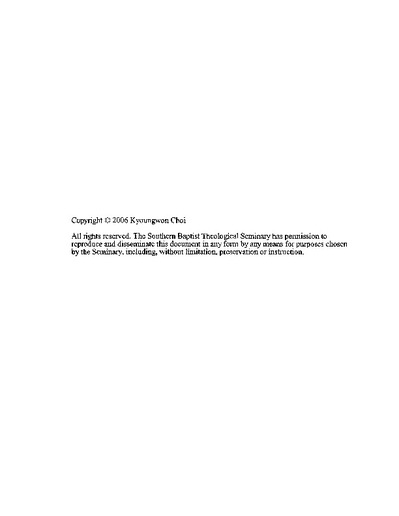| dc.description.abstract | This dissertation examines the function of subject-before-finite-verb clauses in the book of Genesis based on traditional, understanding. Chapter 1 presents an introduction, thesis, and methodology of the project. The research of this dissertation, following the understanding of traditional grammarians concerning subject-before-finite-verb clauses, furnishes the following thesis: all subject-before-finite-verb clauses render the subject prominent by both emphasis and description.
Chapter 2 presents traditional grammarians' view concerning verbal and nominal clauses, including subject-before-finite-verb clauses in particular. They analyze the initial subject as the subject of the entire sentence and the following verb (the predicate) as a verbal clause.
Chapter 3 explains that in narrative statements, the subject is usually more described than emphasized (rarely, more emphasized than described), though both description and emphasis are always present. Subject-before-finite-verb clauses may begin, transition/resume, or end a narrative, or they may give general descriptive statements. Emphasis appears stronger than description in some contrastive constructions, emphasis and description are more or less equal in other contrastive constructions, emphasis appears stronger than description with addition of certain particles and/or independent pronouns, after certain introductory formulas, with multiple subjects with modification, and when they continue a narrative.
Chapter 4 offers the examination of subject-before-finite-verb clauses in non-narrative statements. The discussion in this chapter follows the same structure as Chapter Three. In non-narrative statements, the subject is usually emphasized (very rarely, more described than emphasized), though again both description and emphasis are always present. Description is stronger when the speaker narrates.
Chapter 5 discusses modern attempts to redefine subject-before-finite-verb clauses, as Kautzsch, have confused the distinction between verbal and nominal clauses, which in turn, have perplexed many concerning the proper meaning of verbal and nominal clauses. Moreover, the traditional approach of subject-before-finite-verb clauses assumed a verb-subject for normal word order in Biblical Hebrew. Although Holmstedt has attempted to prove subject-verb as the "basic" word order in Biblical Hebrew, his argument has failed. Hebrew (and Arabic) is a verb-subject language. The traditional approach, therefore, represents the simplest, clearest, most accurate method for analyzing subject-before-finite-verb clauses. | en_US |

